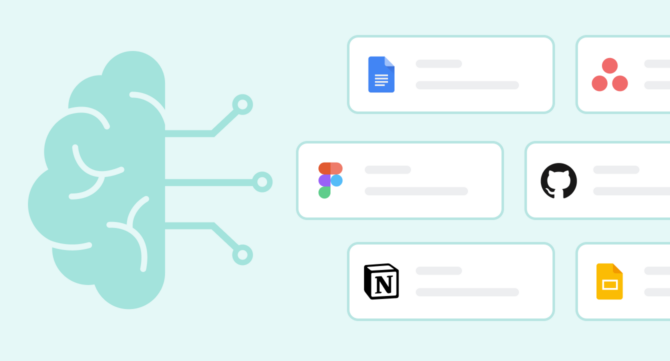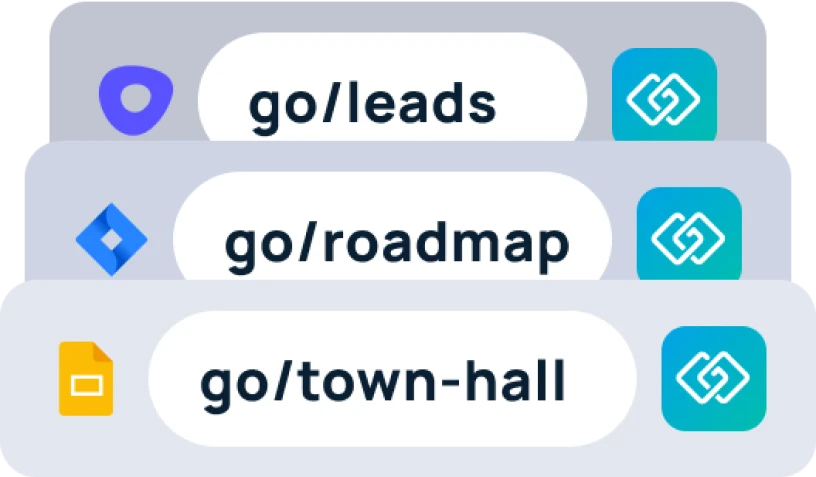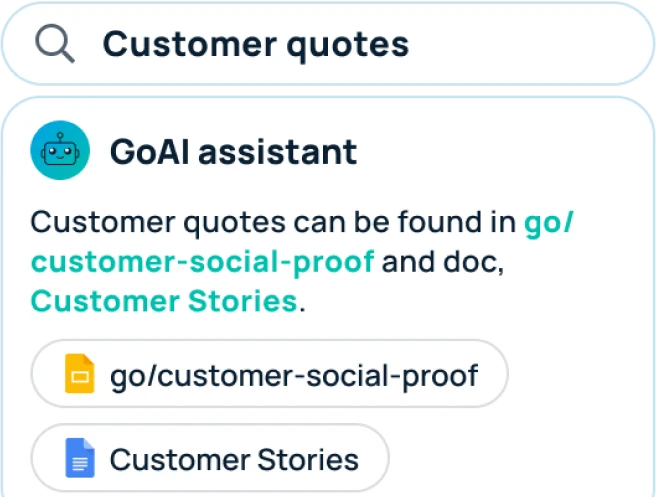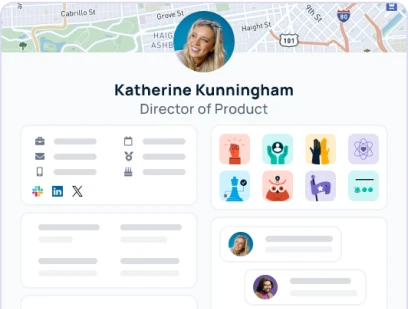Knowledge management — the process of organizing, storing, and sharing information — is absolutely crucial to help your organization run smoothly. Efficient knowledge management gives you a competitive advantage as it helps employees be more productive, getting work done faster and better.
Artificial intelligence (AI) enables you to update information in real time and make knowledge even more accessible to the people who need it. Tap into AI for knowledge management to make your internal knowledge sharing more effective than ever.
Leveraging AI for knowledge management
How do AI and knowledge management connect? AI can help with knowledge management via methods like chatbots, Natural Language Processing (NLP), and automatic categorization.
Chatbots and virtual assistants for instant knowledge access
Chatbots and virtual assistants provide a way for your team to get instant access to the information they need. Bots are trained and programmed to carry out specific tasks, such as retrieving direct links to specific documents. Virtual assistants like these are highly efficient and create less work for the human intelligence on your team.
GoSearch offers a chatbot that uses generative AI to search apps you’ve connected to and respond to your queries with the most relevant information. The GoSearch chatbot also integrates with Slack, so you can search and share documents in any Slack channel.

Automatic content tagging and categorization
Auto-tagging is an AI capability where relevant tags are automatically added to pieces of content. This helps categorize and organize various pieces of content, making it easier to quickly find the most relevant items.
If you’re looking for a tool that can do this, check out Clarifai (which lets you create custom categories to automate asset tagging for your digital assets) or Cloudinary (which offers a Google Automatic Video Tagging add-on, combining Google’s automatic video tagging with Cloudinary’s video management).
AI-powered content recommendations
Artificial intelligence can make personalized content recommendations based on its analysis of user behavior and preferences. For example, you can receive recommendations for internal documents that AI pulls from your knowledge base.
GoSearch provides these personalized recommendations anytime you run a search. When you type in your query, GoAI will search across any apps you’ve connected — like Google Docs, Jira, or Confluence — to find the most relevant information.

Natural Language Processing (NLP) for unstructured data
A machine learning technology known as Natural Language Processing (NLP) can take unstructured data (information that isn’t organized in a predefined manner) and transform it into structured data instead — something that has a standardized format.
How is this helpful? Converting data into structured data lets you extract and analyze knowledge. It’s easier to take away actionable insights when data is presented in a structured format. And using NLP is a great way to get there.
Knowledge loss prevention
AI can help prevent knowledge loss, which occurs when part of your company’s collective knowledge is lost. For instance, you can use AI for automated documentation, which helps retain knowledge by ensuring none of your content falls through the cracks.
Another AI-powered method is to identify and capture tacit knowledge. Tacit knowledge is hard to explain or transfer; AI helps by analyzing data to identify and extract tacit knowledge. You can also use predictive analytics for knowledge gaps, projecting areas where employees might lack knowledge in the future.
Benefits of AI-enhanced knowledge management
Incorporating AI into your knowledge management system holds several benefits. For example, your organization will enjoy:
- Higher productivity. AI improves efficiency by processing information more quickly and accurately.
- Enhanced decision-making. Make smarter, quicker decisions with precise information at your fingertips.
- Reduced knowledge silos. A knowledge silo isolates information, keeping it confined to a single person or team. AI for knowledge management helps spread data to everyone.
- Better employee satisfaction. Finally, AI knowledge management also helps improve the employee experience as employees have what they need to do their jobs.
Challenges and considerations
While AI-powered knowledge management holds a plethora of benefits, it’s not without challenges. You might run into issues around data privacy and security. Make sure to keep your data safe with strong cybersecurity measures.
AI bias and fairness can also be a problem. Often, AI systems can have biases in their data or modeling. And you might struggle with getting your employees to adopt and use AI-powered systems. Be aware of these potential issues so you can proactively circumvent them.
Future trends in AI-driven knowledge management
Artificial intelligence is here to stay. And for organizations like yours, that’s good news — meaning you can use AI to improve your knowledge management platform for years to come. What’s next up in the world of AI knowledge bases? Take a look at these projected trends:
- AI-generated content and documentation. AI can generate content for internal use, like a style guide or onboarding instructions.
- Knowledge graphs and semantic search. Rely on artificial intelligence to create knowledge graphs and to perform semantic search — searches with meaning and context rather than simply scanning for a keyword.
- AI-powered insights and analytics. AI offers a powerful look into the analytics you need, helping drive decisions and actions that lead to better outcomes for you.
AI for Knowledge Management FAQ
How does AI in knowledge management address potential biases in data or modeling?
AI in knowledge management can address potential biases in data or modeling through various mechanisms. Firstly, AI algorithms can be designed to detect and mitigate biases within datasets by implementing techniques such as bias detection algorithms or fairness-aware machine learning models.
Additionally, AI systems can be programmed to continuously learn and adapt, refining their models over time to minimize biases. Furthermore, transparency and interpretability features can be built into AI systems, allowing users to understand how decisions are made and identify and rectify any biases that may arise.
Can AI-powered knowledge management platforms integrate with existing systems seamlessly?
AI-powered knowledge management platforms are often designed with interoperability in mind, allowing them to seamlessly integrate with existing systems within an organization. Through APIs (Application Programming Interfaces) and other integration methods, AI platforms can connect with various data sources, document repositories, communication tools, and other software used by the organization.
This seamless integration ensures that users can access relevant knowledge and information from within familiar workflows and interfaces without the need for significant changes or disruptions to existing systems.
How does the integration of AI into knowledge management impact traditional methods of information retrieval and sharing within an organization?
The integration of AI into knowledge management can significantly impact traditional methods of information retrieval and sharing within an organization. AI-powered systems can enhance the speed, accuracy, and efficiency of information retrieval by providing personalized recommendations, predictive search capabilities, and natural language processing functionalities. This can streamline the process of finding relevant information, reducing the reliance on manual search methods and improving overall productivity.
Additionally, AI-enabled knowledge management platforms can facilitate more effective sharing of information by automatically categorizing and tagging content, making it easier for users to discover and access relevant resources. However, this shift may also require organizations to adapt their workflows and processes to fully leverage the capabilities of AI-driven knowledge management systems.
Embrace AI for better organizational knowledge management
Using AI for knowledge management can revolutionize your organization, helping your team work smarter and faster with the information they need at their fingertips. Get started with GoSearch. As an enterprise search tool fully powered by AI, GoSearch will make your knowledge management more efficient and effective than ever. Click here to schedule a demo and learn more.









